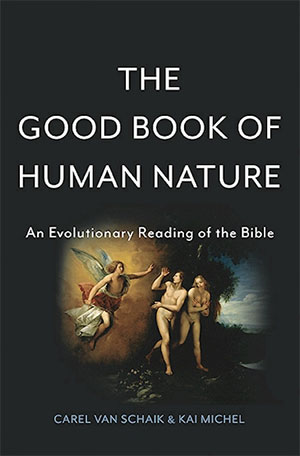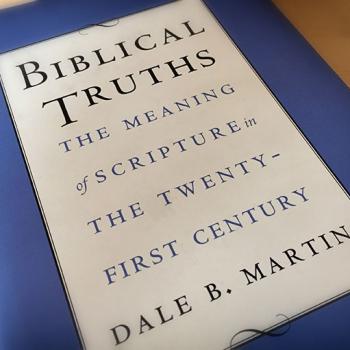 When it comes to the Bible, negotiating the span between religious reverence and secular scorn can be a daunting task of intellectual funambulism. Too often, the faithful view the Bible solely as a divine message from God, immune to critical analysis. Likewise, the non-religious often dismiss the Bible as an irrelevant–or even dangerous–collection of outdated and ignorant writings.
When it comes to the Bible, negotiating the span between religious reverence and secular scorn can be a daunting task of intellectual funambulism. Too often, the faithful view the Bible solely as a divine message from God, immune to critical analysis. Likewise, the non-religious often dismiss the Bible as an irrelevant–or even dangerous–collection of outdated and ignorant writings.
In their new book, The Good Book of Human Nature, (Basic Books, $29.99), evolutionary anthropologist Carel van Schaik and historian Kai Michel capably bridge this gap, boldly defending the thesis that the Bible is the most important book in the history of humanity. Though both agnostic, they believe that the Bible offers an invaluable key to a better understanding of ourselves. Through the lenses of cognitive science, evolutionary biology, archeology, and religious history, they explore what the Bible reveals about human nature and the cultural evolution of our species:
“In the Bible we find answers to humanity’s greatest questions. We do not mean this in a religious sense. Rather, it teaches us why we fear death, how we deal with great misfortunes, and where our deep-seated desire for justice originated. The Bible shows us how we learned to survive in large, anonymous societies, why our modern lives sometimes seem so pointless, and why we are so often nagged by what we should describe as a longing for Paradise. When viewed without its halo, the Bible has something important to say to all of humanity.” (2)
Much of their Biblical analysis is informed by the pivotal moment in human cultural evolution when homo sapiens transitioned from living as hunter-gatherers to the sedentary way of life we still live out today. This new mode of existence led to myriad social stressors and inequalities that posed deep problems for our distant ancestors. The authors describe these challenges as “mismatch problems … difficulties created by our sedentary way of life, which were so new and urgent that people had to develop cultural solutions to bring them under control” (284).
Van Schaik and Michel discover these “cultural solutions” throughout the Bible, woven into the fabric of the biblical accounts of Adam and Eve, Cain and Abel, the Tower of Babel, the Exodus, Moses and Mosaic Law, Job, the Prophets, the Psalms, and the New Testament. Reading these texts from a biological-anthropological perspective, the authors unveil insights into morality, justice, and humanity’s struggle to make sense of its place in the world.
Of particular note is the chapter on biblical violence. Van Schaik and Michel soundly refute those who would paint the Old Testament as an irredeemably violent text reflective of a cruel and vindictive God. To the contrary, they view the morality expressed in the Old Testament as representing a crucial step forward in our cultural evolution, concluding that:
“At a time when societies were in danger of collapsing under the violent egos of tyrants and emperors, this God was the best thing that could happen to the people. They had to identify a cause for every catastrophe, meaning they had to find out why God had reacted with such rage. And because God got angry at the same things that angered people, his divine morality was a projection of human morality. He hated exorbitant luxury, despised injustice, and demanded that people treat their peers well. After all, this is exactly what our first nature whispers into our ears.” (252)
The Good Book of Human Nature is a tour de force of cross-disciplinary insight, offering challenging reinterpretations of texts that many of us take for granted. Those on all sides of these issues will likely find more than a few points of contention with the authors’ conclusions–that’s simply the nature of a book with such a sweeping and provocative perspective. But aside from mere matters of opinion, there were two notable instances where it seemed to me that the authors came up a bit short.
Van Schaik and Michel too-hastily dismiss the fear of death as a foundational motivation for religious belief, saying “it is a massive—albeit widespread—misconception to presume that religion’s main function is to take away our fear of death. This is simply not the case” (284). But they fail to interact at all with the seminal work of Ernest Becker on that topic. Perhaps the authors are correct that the fear of death is a relatively modern concern and not an essential part of the evolutionary development of religious belief, but, for me at least, they failed to make a convincing case in that regard.
Likewise, their frustratingly brief section on Jesus’ crucifixion presents only two understandings of the atonement: either as a sacrifice or as a ransom payment. In but a single sentence they dismiss the notion of sacrifice as making no sense: “[people] didn’t kill the son of the being supposed to forgive their sins and thereby cleanse them. Their debt would have been immeasurable if they had. So it seems that we must reject this possibility” (358). Instead, they conclude that “God had to pay with his son’s life to ransom humanity from Satan” (359). It is a glaring oversight that at this point they fail to interact with other theories of atonement, and especially that they don’t acknowledge the work of René Girard, whose theory of mimetic violence offers a profoundly important alternative understanding of not just the atonement, but of the entire history of human cultural interaction.
Though the omission of Becker’s and Girard’s work is an unfortunate oversight, it by no means invalidates van Schaik and Michel’s broader project of examining the Bible in light of evolutionary anthropology. It is a rare work that can truly draw new insights from texts that have been pored over for thousands of years. The Good Book of Human Nature challenges us to reexamine the text that is central to the faith over over 2 billion people today, and in doing so, to reconsider our ourselves and our culture.
To find out more about The Good Book of Human Nature or to purchase a copy, visit www.basicbooks.com/full-details?isbn=9780465074709.
 Dan Wilkinson
Dan Wilkinson
Dan is the Executive Editor of the Unfundamentalist Christians blog. He is a writer, graphic designer and IT specialist. He lives in Montana, is married and has at least two cats.












